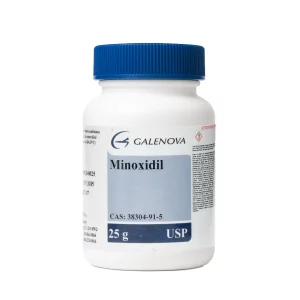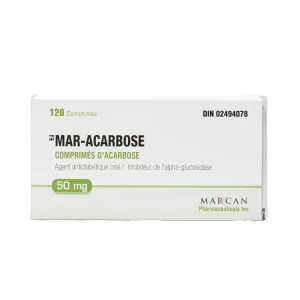Your cart is empty.
Your cart is empty.
Heart health remains one of the most important aspects of maintaining longevity and overall wellness. Cardiovascular disease continues to be a leading cause of mortality worldwide, making prevention strategies essential for healthy aging. Acarbose, originally developed for blood sugar control, is being studied for its potential cardiovascular protective effects. Understanding Acarbose for Longevity benefits, learning how Acarbose reduces inflammation, and knowing where to shop Acarbose at Elivena have become important considerations for health-conscious individuals.
Emerging research suggests significant connections between blood sugar control and heart health. The scientific evidence continues to reveal acarbose’s potential for cardiovascular protection beyond its original diabetes treatment purpose.

Acarbose is a medication that slows sugar absorption during digestion. It works by blocking enzymes that break down carbohydrates, reducing blood sugar spikes after meals. These spikes, if uncontrolled, may contribute to long-term blood vessel damage.
Stable blood sugar supports heart health by limiting the oxidative stress and inflammation caused by glucose overload. Over time, this may help protect against cardiovascular disease.
When blood sugar spikes, sugar molecules can bind to proteins in artery walls through a process called glycation, causing stiffness and plaque buildup. These changes increase the risk of heart disease.
High glucose levels also trigger inflammation and stress responses that strain the cardiovascular system. Insulin resistance compounds these issues by placing more pressure on the heart and blood vessels.

Acarbose helps smooth out post-meal blood sugar levels, easing stress on blood vessels. By blocking enzymes that digest carbs, it prevents rapid glucose surges that may trigger inflammation and oxidative stress.
This gentler blood sugar pattern supports vascular function and reduces biochemical triggers linked to heart disease. Acarbose’s effect is localized to the digestive tract, offering targeted metabolic benefits.
Clinical trials provide encouraging data on acarbose’s potential cardiovascular benefits. The STOP-NIDDM trial found a 49% reduction in cardiovascular events among people with impaired glucose tolerance who used acarbose. The ACE trial also explored these effects in patients with coronary heart disease and showed promising diabetes prevention outcomes.
Improved glucose control from acarbose may contribute to better blood pressure regulation by reducing vascular stress. In the STOP-NIDDM trial, acarbose users had a 34% lower incidence of new hypertension cases, suggesting a broader benefit for circulatory health.
Acarbose can positively affect cholesterol levels through improved carbohydrate metabolism. The medication helps optimize HDL and LDL cholesterol ratios by reducing post-meal glucose spikes. These improvements in lipid profiles contribute to overall cardiovascular risk reduction.
Studies show modest but meaningful improvements in triglyceride levels with acarbose treatment. The medication’s effects on lipid metabolism appear related to its glucose-controlling properties. Better lipid profiles combined with improved glucose control create synergistic cardiovascular protection benefits.
Acarbose may reduce inflammation markers that contribute to cardiovascular disease. High blood sugar triggers inflammatory responses that damage blood vessels and promote heart disease. By controlling glucose spikes, acarbose helps reduce these harmful inflammatory processes.
Research indicates that acarbose treatment can lower C-reactive protein and other inflammatory markers. Chronic inflammation plays a central role in cardiovascular disease development and progression. Reduced inflammation from better glucose control creates significant cardiovascular protection over time.
Acarbose supports healthy blood vessel function by preventing glucose-related damage to arterial walls. The medication helps maintain arterial flexibility and elasticity through reduced oxidative stress. Better glucose control preserves the delicate lining of blood vessels called the endothelium.
Studies show improvements in vascular health markers with acarbose treatment. The medication appears to slow the progression of arterial stiffening that occurs with aging. Healthier blood vessels function more efficiently and resist the development of cardiovascular disease over time.
Acarbose supports modest weight management by reducing calorie absorption from carbohydrates. Healthy weight maintenance directly reduces cardiovascular risk through multiple mechanisms. Even small weight reductions can provide meaningful cardiovascular protection benefits.
Research demonstrates that weight management with acarbose contributes to overall cardiovascular risk reduction. The medication’s effects on weight appear gradual but sustainable over time. Combined weight and glucose control benefits create comprehensive cardiovascular protection strategies.
Cardiovascular research typically uses acarbose doses of 50–100 mg three times daily with meals. These doses align with standard medical recommendations for glucose control. Gradual dose adjustment helps optimize cardiovascular benefits while minimizing digestive adaptation issues.
Timing recommendations suggest taking acarbose with the first bite of each main meal. This approach maximizes the medication’s glucose-controlling effects that provide cardiovascular protection. Individual variation in cardiovascular response may require personalized dosing approaches.
Cardiovascular improvements may develop gradually over months to years of consistent acarbose use. Short-term markers like improved glucose control appear within weeks. Blood pressure and inflammation improvements typically develop over 3–6 months of regular treatment.
Long-term cardiovascular outcomes require years of consistent treatment to become meaningful. Research suggests that cardiovascular protection benefits continue to develop with extended use. Patience remains essential for cardiovascular protection, as heart health improvements accumulate slowly over time.
People with impaired glucose tolerance and multiple cardiovascular risk factors benefit most from acarbose’s heart protection effects. Starting treatment earlier may provide greater cardiovascular protection over time under the supervision of a qualified medical professional.
Acarbose works well with Mediterranean diet patterns and regular exercise for comprehensive cardiovascular protection. Combined approaches targeting multiple risk factors provide optimal heart health outcomes.
Track blood pressure, cholesterol levels, and inflammation markers every 3–6 months initially. Regular monitoring helps assess improvements and guide treatment adjustments for optimal cardiovascular protection.
Expect glucose control improvements within weeks, with cardiovascular benefits developing over months. Signs of positive changes include better blood pressure control and improved exercise tolerance.
Users report improved energy levels, better exercise tolerance, and more stable blood pressure. People track progress through regular monitoring and cardiovascular health assessments. Individual variation in benefits remains significant.
Research shows a 49% cardiovascular event reduction in high-risk individuals.
Yes, with proper monitoring and healthcare provider guidance for preventive use.
Blood pressure improvements appear within 3-6 months, with long-term benefits developing over the years.
Track blood pressure, cholesterol levels, glucose control, and inflammation markers regularly.
Acarbose complements rather than replaces established cardiovascular treatments.
People with glucose intolerance and metabolic syndrome appear to benefit most.
Chiasson, J. L., Josse, R. G., Gomis, R., Hanefeld, M., Karasik, A., & Laakso, M. (2003). Acarbose treatment and the risk of cardiovascular disease and hypertension in patients with impaired glucose tolerance: The STOP-NIDDM trial. JAMA, 290(4), 486-494.
https://pubmed.ncbi.nlm.nih.gov/12876091/
Hanefeld, M., Cagatay, M., Petrowitsch, T., Neuser, D., Petzinna, D., & Rupp, M. (2004). Acarbose reduces the risk for myocardial infarction in type 2 diabetic patients: Meta-analysis of seven long-term studies. European Heart Journal, 25(1), 10-16.
https://pubmed.ncbi.nlm.nih.gov/14683737/
Holman, R. R., Coleman, R. L., Chan, J. C., Chiasson, J. L., Feng, H., Ge, J., Gerstein, H. C., Gray, R., Huo, Y., Lang, Z., McMurray, J. J., Rydén, L., Schröder, S., Sun, Y., Theodorakis, M. J., Tendera, M., Tucker, L., Tuomilehto, J., Wei, Y., Yang, W., Wang, D., Hu, D., Pan, C., & ACE Study Group. (2017). Effects of acarbose on cardiovascular and diabetes outcomes in patients with coronary heart disease and impaired glucose tolerance (ACE): A randomised, double-blind, placebo-controlled trial. The Lancet Diabetes & Endocrinology, 5(11), 877-886.
https://pubmed.ncbi.nlm.nih.gov/28917545/
Kaiser, T., Sawicki, P. T., Beckmann, K., Dabelstein, A., Frommeyer, G., Hupfer, F., Kröner, K., Lange, U., Meyer, J. E., Reinauer, H., Ricken, G., & Siegmund, T. (2004). Cardiovascular benefits and safety profile of acarbose therapy in prediabetes and established type 2 diabetes. Cardiovascular Diabetology, 6, 20.
https://pmc.ncbi.nlm.nih.gov/articles/PMC2040135/





Unlock savings on bundles and elevate your online experience today!